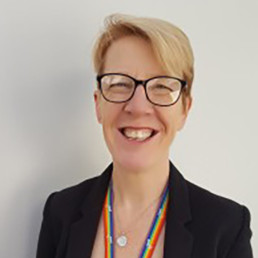
Written by Mel Lane
Mel Lane (she/her) is Head of Education at Pop’n’Olly. She has been a primary school teacher and teacher trainer for nearly 30 years and worked in schools on LGBT+ inclusion policies with thousands of children and school staff. Mel is a co- author of What Does LGBT+ Mean? (Pop’n’Olly, 2021).
When it comes to LGBT+ education in school, parents are often portrayed in the mainstream media as unsupportive and battling with teachers – but the reality is completely different. 82% of parents actively want their children to be taught about diverse families, including those with same-sex relationships. Having worked with over 10,000 children, I have experienced, time and time again, that parents are almost always supportive of LGBT+ inclusion work in school.
However, there are of course still a minority of parents who struggle with, and have concerns, about LGBT+ education. This is why empowering schools and teachers to have effective conversations is important. But how do we do this? Here are some themes that you may wish to include in these discussions:
Ethos and Values
Chances are you already promote equality and celebrate difference in your school. Maybe it’s in your school mission statement? e.g.
‘Brave, unique, caring and kind’
‘Hope, community, respect, love’
‘Respect for each other, Respect for our school, Respect for learning’
LGBT+ isn’t an add-on, it’s part of this whole-school approach. So when having conversations with parents, it’s vital you keep coming back to your whole-school ethos and discuss how LGBT+ education is a part of this.
Children’s Mental Health
We know that children learn better when they feel relaxed and able to be themselves. One teacher was so pleased to share with me how much more animated and engaged a Year 1 child had become after a session on families included two Mums, just like her family. All children benefit from conversations about LGBT+ inclusion because when we celebrate diversity we send a message to everyone that they are welcome in school whatever their uniqueness looks like.
Knowledge and Understanding
63% of 8-15 year olds know someone close to them who is LGBT+ Children are already having conversations about LGBT+ lives and some of them are searching for information online. School is a safe place where children can ask questions of trusted adults to find out reliable, accurate information. UK children all live in a country where being LGBT+ is protected by law and we shouldn’t hide this information from students. In fact, under the United Nations Convention on the Rights of the Child (UNCRC), all children have a right to this information.
Legal Obligations
Helping young people understand and develop positive relationships with people who are different from them is part of UK law and included in the Relationships and Sex Education (RSE) Guidance for Schools
The Public Sector Equality Duty (Section 149 of the Equality Act, 2010) states that schools must have due regard to “the need to eliminate discrimination, advance equality of opportunity, and foster good relations between persons who share a relevant protected characteristic and persons who do not share it.”
Ofsted guidance also states that, “Schools can choose to teach the beliefs of any faith on the protected characteristics. They may explain that same-sex relationships and gender reassignment are not permitted by a particular religion. However, if they do so, they must also explain the legal rights of LGBT people under UK law, and that this and LGBT people must be respected”
Supporting Parents
Sometimes parents worry that life will be harder for their child if they are LGBT+. Sometimes they’re worried about being judged by other parents. Schools often have a lot more experience supporting LGBT+ young people than parents do. A parent of a trans child told me how much better they felt that their child’s school was supportive of their child’s transition – it gave the parent confidence and helped them navigate a completely new and sometimes challenging time.
Conversations with parents almost always eliminate fears, tackle misconceptions and build better relationships. You can find out much more information on how to have these conversations in Pop’n’Olly’s ‘Discussions With Parents’ document.

